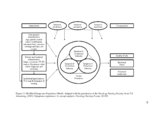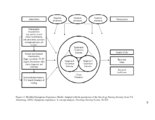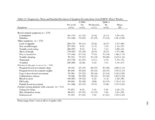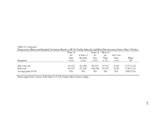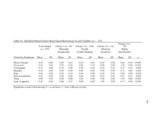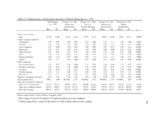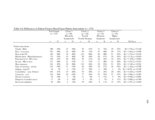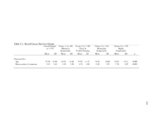| Description |
Colorectal cancer is the third most common cancer in the United States. Atrimodal treatment approach incorporating chemotherapy, radiation therapy, and surgery can lead to a variety of posttreatment symptoms, including fatigue, nausea, diarrhea, sleep changes, and psychological symptoms. This study is the first to identify rectal cancer survivor subgroups based on their symptom experience and examine subgroup differences in quality of life, perceived health status, and emotional status 3 and 15 months postdiagnosis. A secondary aim is to examine whether demographic and clinical variables are related to these outcomes. The National Cancer Institute's Cancer Care Outcomes Research andSurveillance Consortium (CanCORs) provided data on 275 rectal cancer survivors. Cluster analysis was used to identify posttreatment symptom defined survivor subgroups using a modified version of the Symptom Experience Model as the conceptual framework. Study 1 was cross-sectional, examining symptoms 15 months postdiagnosis. Four symptom defined survivor subgroups were formed (minimally symptomatic, tired and trouble sleeping, moderately symptomatic, and highly symptomatic) that significantly differed based on age (p = .009), married/partnered status (p = .01), and mean number of symptoms (p < .001). The minimally symptomatic subgroup was the oldest and least likely to be married/partnered, while the highly symptomatic subgroup was theoldest and least likely to be married/partnered, while the highly symptomatic subgroup was the youngest and most likely to be married/partnered. Study 2 used a pre/posttreatment design to examine subgroup changes in quality of life, perceived health status, emotional status, and the relationship between those changes and other demographic and clinical variables. Subgroups were equivalent at baseline measurement, but differed on quality of life (p < .001),emotional status (p < .001), and perceived health status (p < .001) 15 monthspostdiagnosis, with the minimally symptomatic subgroup reporting the best outcomes. Income (>$40k) significantly predicted better scores on both physical (p = .001) and mental (p = 0.05) components of the quality of life scale, perceived health status (p = .015), and emotional status (p = .007). Results suggest a need for tailored interventions that promote self-care and enhance quality of life, emotional status, and perceived health state in those survivorswho are most at risk. |


















































